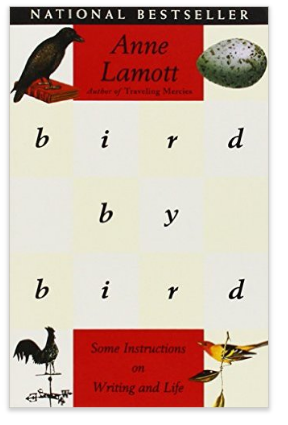 I recently read “Bird by Bird: Some INstructions on Writing and Life” by Anne Lamott. Below are the quotes I found most interesting. If you like the quotes, please buy the book here.
I recently read “Bird by Bird: Some INstructions on Writing and Life” by Anne Lamott. Below are the quotes I found most interesting. If you like the quotes, please buy the book here.
“Writing can be a pretty desperate endeavor, because it is about some of our deepest needs: our need to be visible, to be heard, our need to make sense of our lives, to wake up and grow and belong.” (19)
“One writer I know tells me that he sits down every morning and says to himself nicely, “It’s not like you don’t have a choice, because you do – you can either type or kill yourself”” (22)
“We need to make messes in order to find out who we are and why we are here – and, by extension, what we’re supposed to be writing.” (32)
“As soon as you start protecting your characters from the ramifications of their less-than-lofty behavior, your story will start to feel flat and pointless, just like in real life.” (45)
“One line of dialogue that rings true reveals character in a way that pages of description can’t.” (47)
“Ethan Canin said, “Nothing is as important as a likeable narrator. Nothing holds a story together better.”
“A person’s faults are largely what make him or her likable.” (50)
“THere’s no point in writing hopeless novels. We all know we’re going to die; what’s important is the kind of men and women we are in the face of this.” (51)
“John Gardner wrote that the writer is creating a dream into which he or she invites the reader, and that the dream must be vivid and continuous.” (57)
“Drama is the way of holding the reader’s attention. The basic formula for drama is setup, buildup, payoff – just like a joke.” (59)
“Fix instead on who your people are and how they feel toward one another, what they say, how they smell, whom they fear.” (61)
“Sometimes Alice Adams uses a formula when writing a short story, which goes ABDCE, for Action, Background, Development, Climax, and Ending.” (62)
“Dialogue is the way to nail character, so you have to work on getting the voice right.” (67)
“My friend Carpenter talks about the unconscious as the cellar where the little boy sits who creates the characters, and he hands them up to you through the cellar door. He might as well be cutting out paper dolls. He’s peaceful; he’s just playing.” (72)
“Writing involves seeing people suffer and, as Robert Stone once put it, finding some meaning therein.” (97)
“In those moments, you see that you and the chipmunk are alike, are a part of a whole. I think we would see this more often if we didn’t have our conscious minds. THe conscious mind seems to block that feeling of oneness os we can function efficiently, maneuver in the world a little bit better, get our taxes done on time.” (98)
“”The Gulf Stream will flow through a straw provided the straw is aligned to the Gulf Stream, and not at cross purposes with it.” … So now I always tell my students about the Gulf Stream: that what it means for us, for writers, is taht we need to align ourselves with the river of the story, the river of the unconscious, of memory and sensibility, of our characters’ lives, which can then pour through us, the straw.” (121)
“If you want to know how God feels about money, look at whom she gives it to.” (128)
“Historically, when people do too well too quickly, they are a Greek tragedy waiting to happen. I, who did not do too well too quickly and who was in fact not doing too well over time, was actually in the catbird seat.” (128)
“When a child comes out of your body, it arrives with about a fifth of your brain clutched in its little hand.” (137)
“I told him that the best possible thing was to shoot high and make mistakes, and that when he was old, or dying, he was almost certainly not going ot say, “God! I’m so glad I took so few risks! I’m so glad I kept shooting so low!”” (156)
“To be great, art has to point somewhere.” (205)
“The coach says, “If you’re not enough before the gold medal, you won’t be enough with it.”” (218)
“If something inside you is real, we will probably find it interesting, and it will probably be universal. So you must risk placing real emotion at the center of your work. Write striaght into the emotional center of things. Write toward vulnerability. Don’t worry about appearing sentimental. Worry about being unavailable; worry about being absent or fraudulent. Risk being unliked. Tell the truth as you understand it. If you’re a writer, you have a moral obligation to do this. And it is a revolutionary act – truth is always subversive.” (226)
Liked the quotes? Click here to buy the book.

